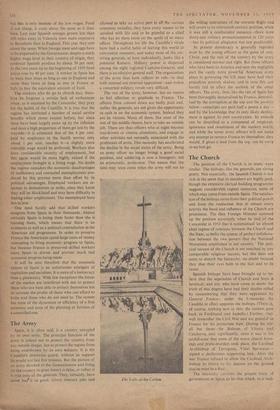The Army
Spain, it is often said, is a country occupied by its own army. The principal function of the army is indeed not to protect the country from any outside danger, but to protect the regime from being overthrown by its own subjects. It is the Caudillo's przetorian guard; without its support he would not last live minutes. But the picture of an army devoted to the Generalissimo and living on the country in great luxury is false, or rather it is true only of the generals. They, certainly, have never had. it so good. Given sinecure jobs and allowed to take an active part in ail the various economic swindles, they have every reason to be satisfied with life and to be grateful to a chief who has let them loose on the spoils of so many offices. Throughout his life the Caudillo's rivals have had a useful habit of leaving this world at convenient moments, and today none of the sur- viving generals, at least individually, looks like a potential Kassel». Military power is dispersed among the eight regional Captains-General, and there is no effective general staff. The organisation of the army thus both reflects its role—to deal with internal not external opposition—and makes a concerted military revolt 'very difficult.
The rest of the army, however, has no reason to feel affection or gratitude to Franco. The officers from colonel down are badly paid and, unlike the generals, are not given the opportunity to cash in on the economic system. Instead they are its victims. Many of them, like most of the rest of the middle classes, have to take an outside job. There are thus officers who at night become taxi-drivers or cinema attendants, and engage in other activities not normally associated with the profession of arms. This necessity has accelerated the decline in the social status of the army. Being an army officer no longer brings a good social position, and soldiering is now a bourgeois, not an aristocratic, profession. This means that the time may soon come when the army will not be The Valle de lo4 Caidos. the willing instrument of the extreme Right and will revert to its nineteenth-century position, when it was still a confounded nuisance—there v‘ ere thirty-one military pronunciamentos in 120 years —but its political allegiance was less predictable. At present democracy is generally regarded even by the young otlicers as the guise of anti- Christ, and the rule of the country by the army is considered normal and right. But those officers who have been to America and seen the negligible part the vastly more powerful American army plays in governing the US must have had their prejudices severely shaken, and in time this can hardly fail to affect the outlook of the other officers. The army, then, like the rest of Spain has been thoroughly demoralised by Franco, demoral- ised by the corruption at the top and the poverty below—conscripts are paid half a peseta a day— and by the knowledge that its only likely deploy- ment is against its own countrymen. Its attitude can be described as a compound of suspicion, ignorance and resentment of the modern world, and while the lower army officers will not make any attempt to remove Franco by themselves, they would, if given a lead from the top, not be sorry to see him go.










































 Previous page
Previous page